Software Engineering Performance Management
Software engineering teams need to meet rigorous production metrics to stay competitive, but how do leaders measure and manage their employees’ performance?
One minute insights:
 Software engineering leaders measure performance using project management tools like Jira
Software engineering leaders measure performance using project management tools like Jira Many measure employee performance as a way to address problems, like bugs and project delays
Many measure employee performance as a way to address problems, like bugs and project delays Engineering leaders set clear goals and offer ongoing training to improve their employees’ performance
Engineering leaders set clear goals and offer ongoing training to improve their employees’ performance Many are satisfied with their process for employee performance management, but a lack of leadership support can act as a barrier for those who aren’t satisfied
Many are satisfied with their process for employee performance management, but a lack of leadership support can act as a barrier for those who aren’t satisfied Better alignment with business objectives is a top benefit of employee performance management
Better alignment with business objectives is a top benefit of employee performance management
Software engineering leaders use project management tools to measure performance, and many do so at least quarterly
66% of respondents use project management tools like Jira to monitor and evaluate their employees’ performance. Scheduled progress check-ins (58%) and formal, one-on-one reviews (57%) were also common approaches.
How do you monitor and evaluate employee performance? Select all that apply.
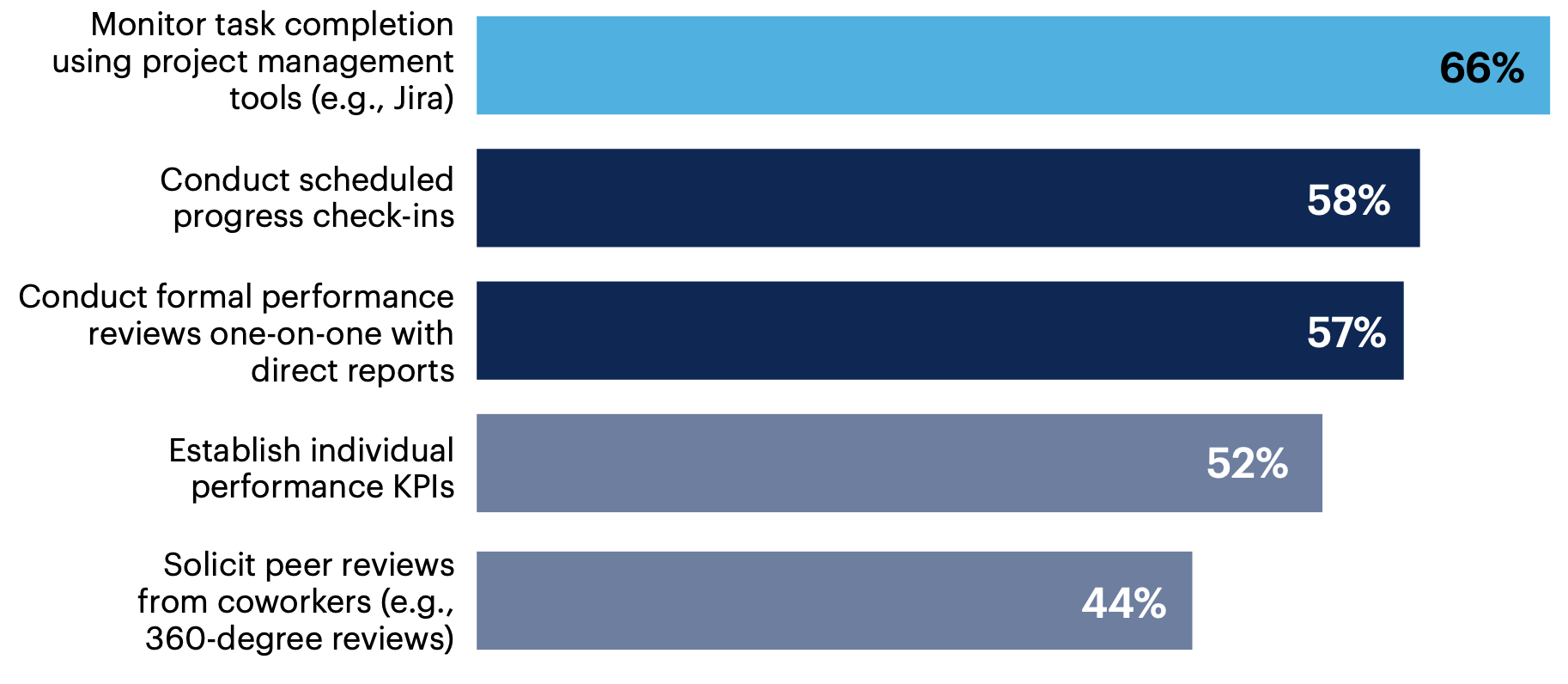
Offer employees chances to self-assess their performance 31% | Utilize management by objective (MBO) 17% | None of these 0% | Other 0%
n = 300
42% of respondents use Workday HCM to manage their employees’ performance.
What tool(s) do you use to manage employee performance? Select all that apply.
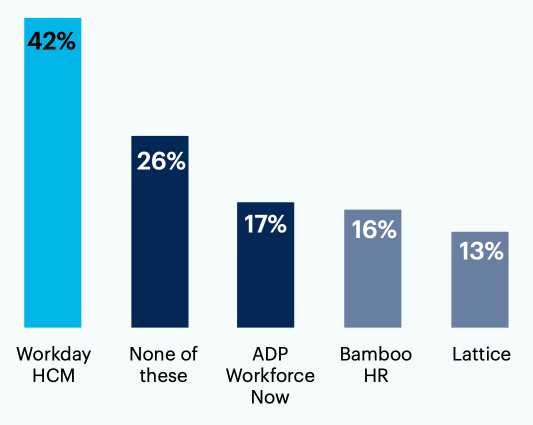
Wrike 8% | 15Five 7% | bob 6% | Zenefits 6% | Leapsome 4% | Other (Asana; custom application ORL; Darwinbox ; Happy5; homegrown; Jira; Oracle Performance Management; Small Improvements; SuccessFactors; GitHub and other tools) 4% | Trakstar 3% | PerformYard 3%
n = 300
How frequently do you measure your team’s performance?
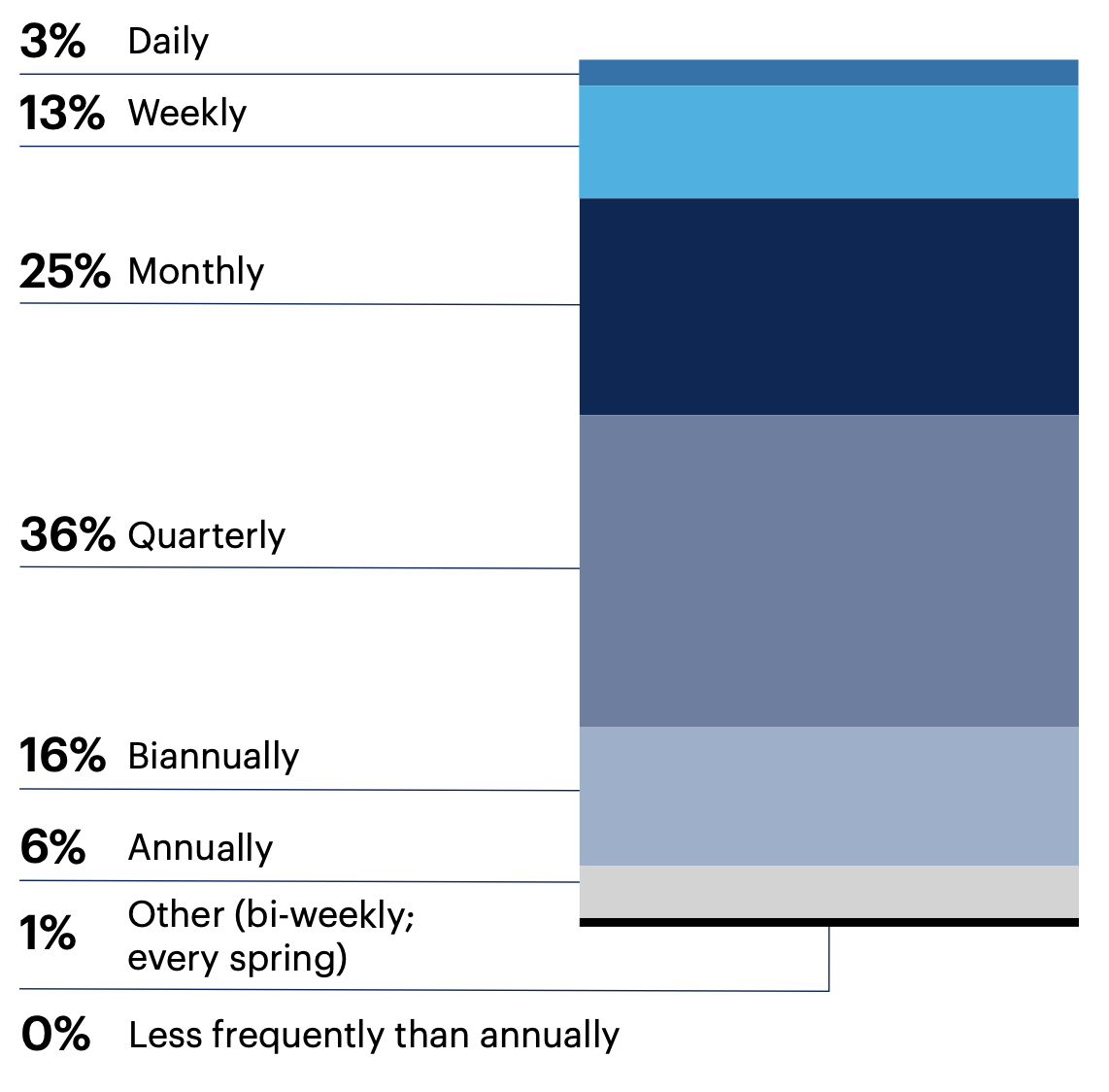
More than one-third (36%) of respondents measure their employees’ performance on a quarterly basis, while one-quarter (25%) measure it monthly.
n = 300
Note: May not add up to 100% due to rounding
Question: What’s one thing you wish everyone knew about performance management on software engineering teams?
Question: What advice would you give to other leaders in regard to evaluating engineering team performance?
Peer input into the assessment is critical for a manager to fully know and evaluate performance.
Make sure your team understands the value that a performance management system provides. Engineers aren’t always aware of this.
Tech leaders measure performance to address problems, and they look at how employees use documentation
60% of respondents aim to address problems like bugs or delays through their engineering performance management. Identifying productivity issues (56%) and communication and collaboration issues (55%) were also common goals.
What are your performance management goals for your engineering team? Select all that apply.
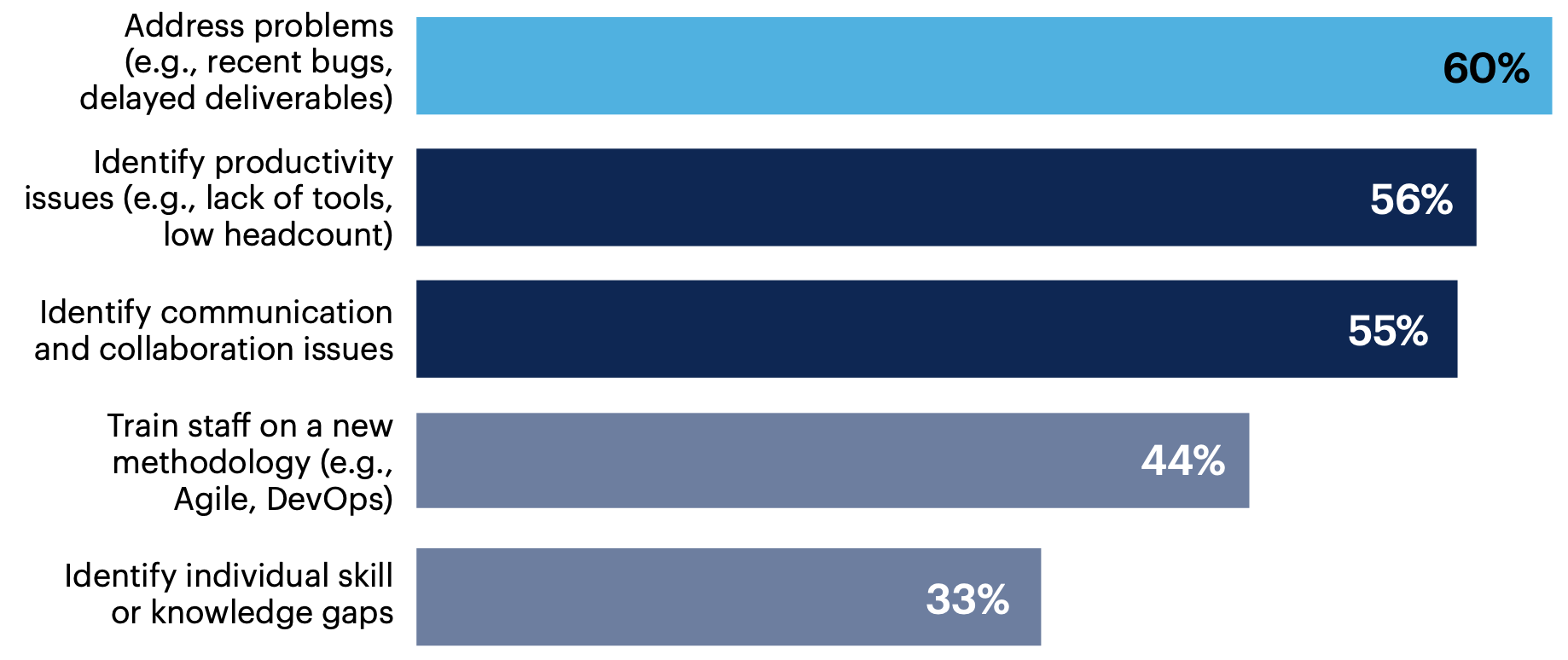
Identify successes 30% | Evaluate employees for raises 28% | Evaluate employees for promotions 24% | Evaluate overall team performance 23% | Evaluate employees for bonuses or perks 21% | Offer feedback 17% | None of these 0% | Other 0%
n = 300
To determine an employee’s performance, respondents measure skills in documentation utilization (40%), adherence to their organization’s software development methodology (36%) and code stability (36%). Few (10%) measure management and leadership skills.
What skills are most important to measure to determine an employee’s performance? Select up to 3.
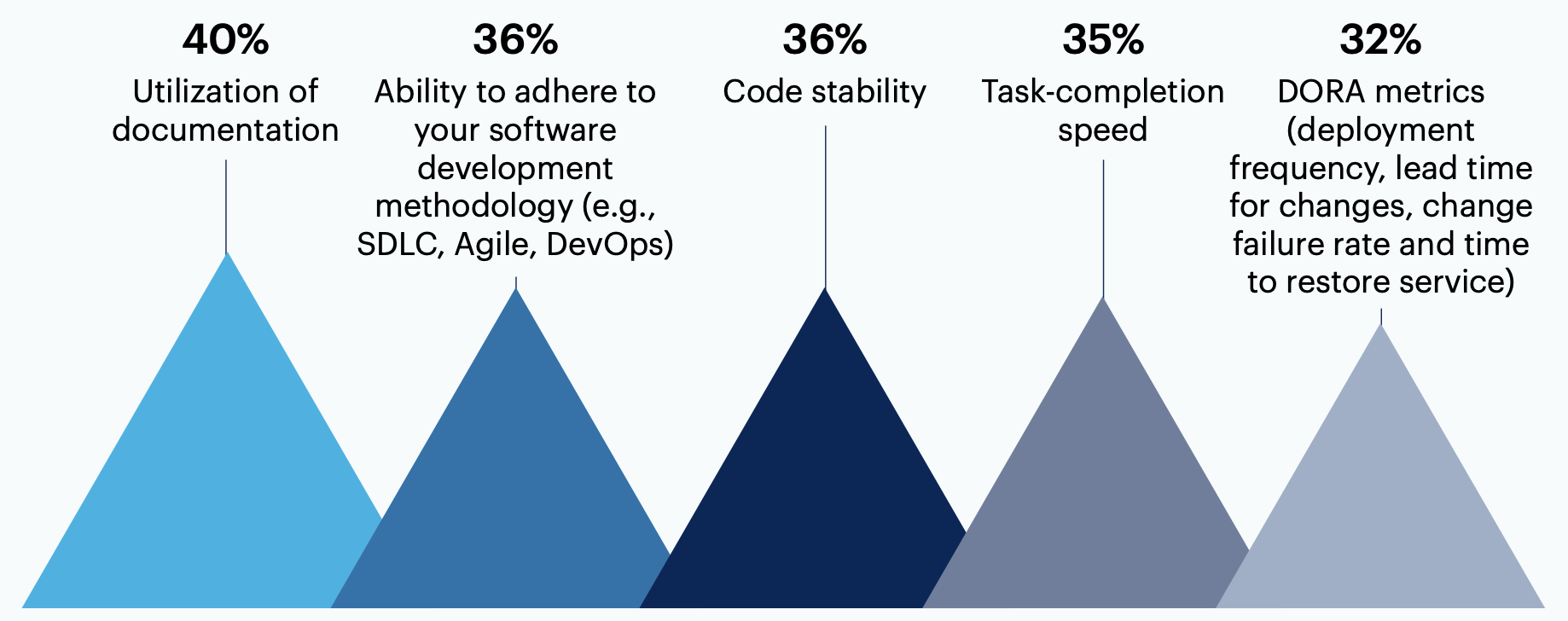
Collaboration skills 31% | Iteration speed 30% | Communication skills 29% | Problem-solving abilities 28% | Code churn 24% | Proficiency with relevant programming languages 20% | Planning and organizational skills 20% | Management and leadership skills 10% | None of these <1% | Other (software quality) <1%
n = 300
Question: What’s one thing you wish everyone knew about performance management on software engineering teams?
Our company also measures personal behaviors’ alignment and support of certain desired behaviors defined company wide in the assessment of staff performance.
Measurement needs to be consistent and ongoing, across the entire team.
Engineering leaders set clear goals and provide ongoing training to improve employee performance
What strategies do you use to improve the performance of the engineering team? Select all that apply.
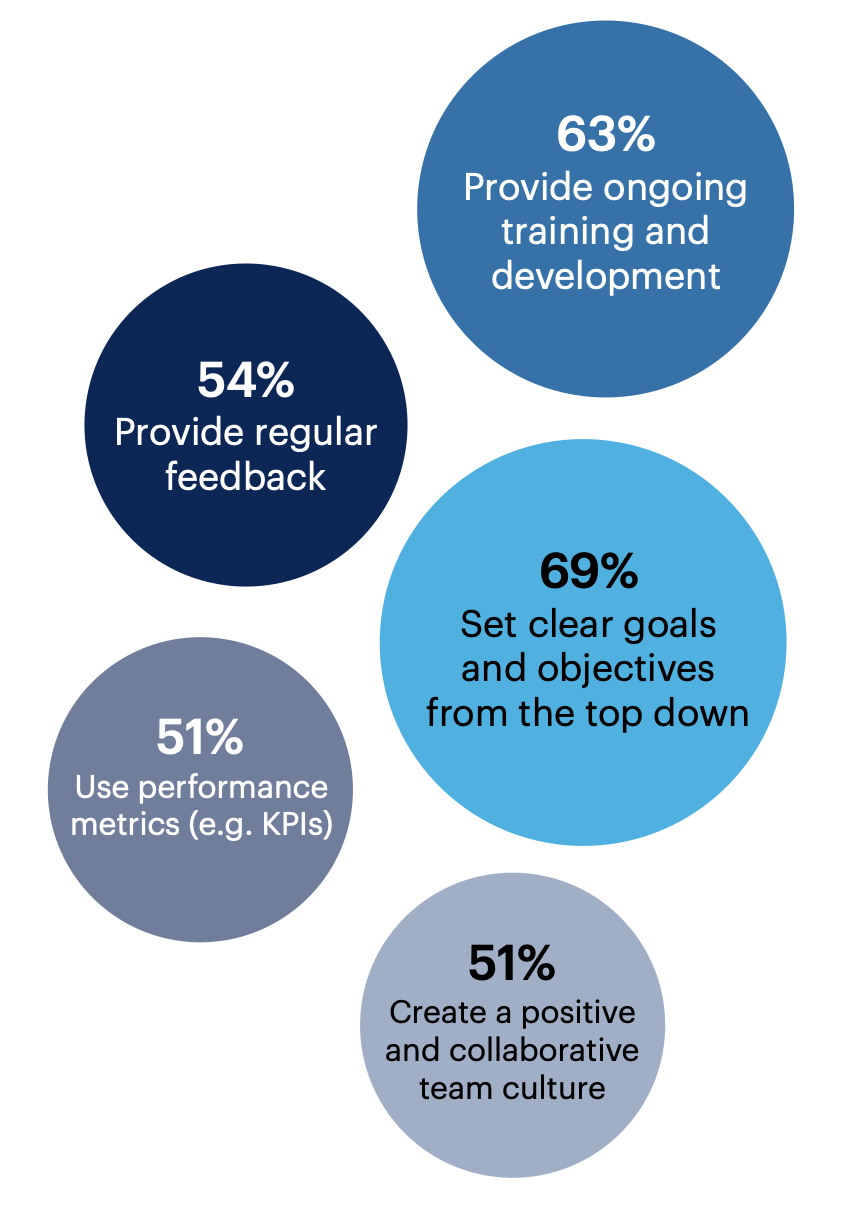
69% of respondents improve the performance of their team by setting clear goals and objectives. 63% offer ongoing training, and 54% provide regular feedback.
Celebrate success 41% | Identify bottlenecks 35% | Encourage innovation 33% | Advocate for the team at a senior level 25% | Other (pair programming; recognize and reward outstanding performance) 1% | None of these 0%
n = 300
Question: What advice would you give to other leaders in regard to evaluating engineering team performance?
Question: What’s one thing you wish everyone knew about performance management on software engineering teams?
Be clear in communicating expectations and provide employees the necessary tools, environment, and team collaboration to be successful. Do regular reviews with individual employees as well as individual groups for any given projects. Ensure that employees’ feedback deserves the appropriate response.
The [performance management] process must be rolled out with clear explanations on the purpose and function.
Nearly half are satisfied with their current employee management process, and better alignment with business objective is a key benefit
40% of respondents are moderately satisfied with their documented employee performance management process, while 6% are very satisfied. 26% are moderately dissatisfied, and 4% are very dissatisfied.
How satisfied are you with your documented process for employee performance management?
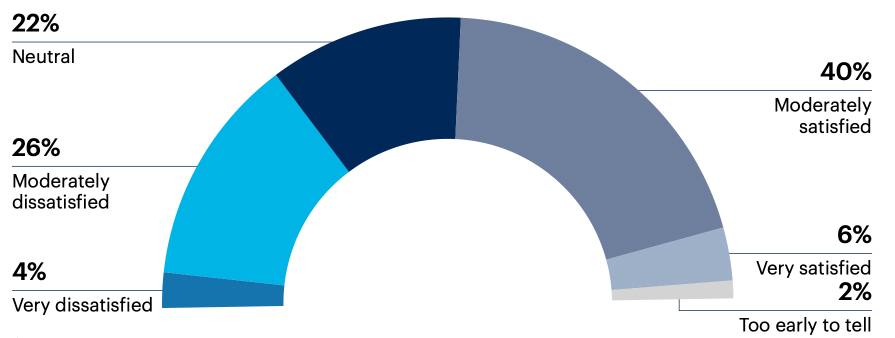
n = 300
Note: May not add up to 100% due to rounding
Among those who were very or moderately dissatisfied with their performance management process (n = 91), 45% said a lack of leadership support acted as a barrier to effective performance management. Changing company KPIs (43%), employee resistance (42%) and high turnover (41%) also present challenges.
What barriers are preventing you from effectively managing the performance of your engineering team? Select up to 3.
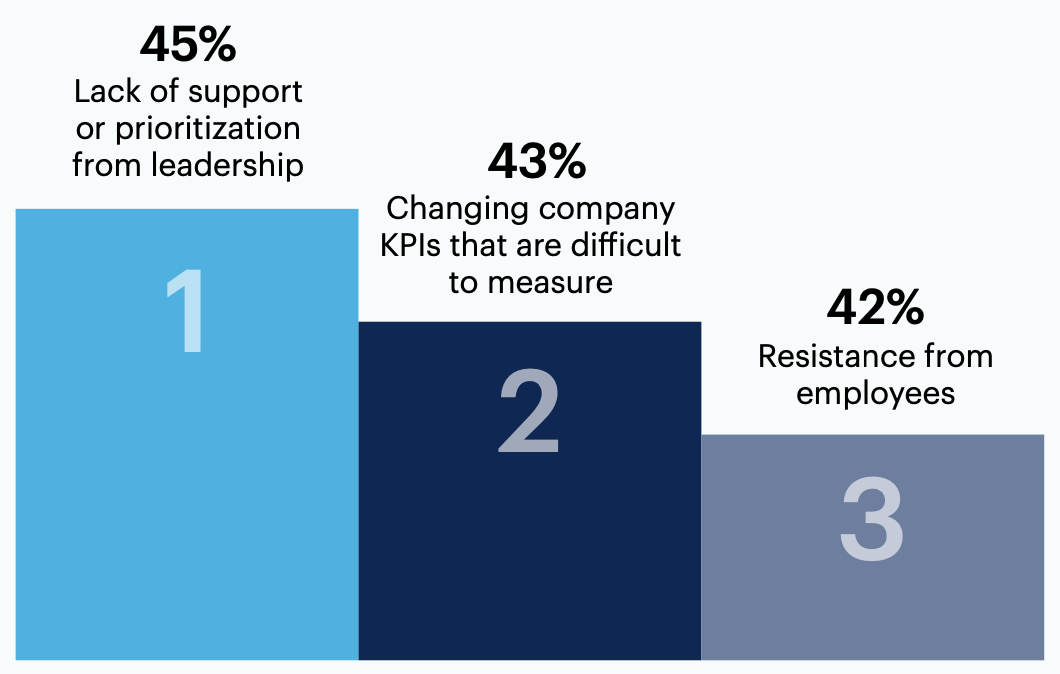
High employee turnover that makes it hard to establish procedures 41% | Lack of documentation on the employee review process 23% | Lack of effective ways to follow up on feedback 23% | Lack of management headcount to conduct regular employee reviews 22% | Current process takes too long to complete 16% | Current process is too rigid and unadaptable 12% | Current process is confusing 11% | None of these 0% | Other 0%
n = 91
Question shown only to respondents who answered “very dissatisfied” or “moderately dissatisfied” to the question “How satisfied are you with your documented process for employee performance management?”
56% of all respondents said that their employee performance management system has improved alignment between engineering and business objectives. Higher-quality code (40%) and clearer expectations for employees (40%) were also prominent benefits.
What benefits have you experienced as a result of your employee performance management system? Select up to 3.
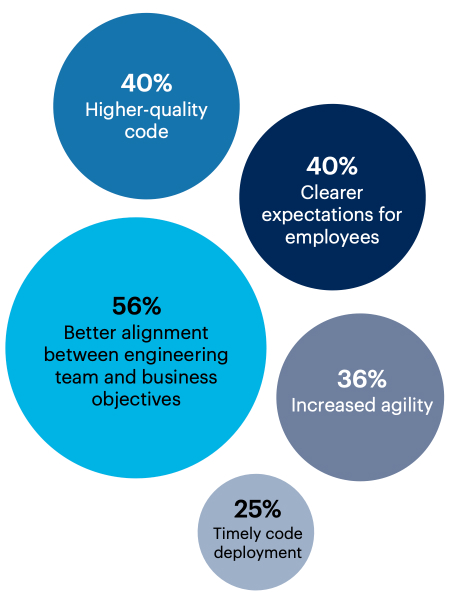
More advancement opportunities for employees 24% | Increased scalability 23% | Reduced employee turnover 15% | Higher employee engagement and morale 15% | More learning opportunities for employees 11% | Reduced production costs 8% | We’ve seen no benefits 2% | Other 0%
n = 300
Question: What advice would you give to other leaders in regard to evaluating engineering team performance?
Question: What’s one thing you wish everyone knew about performance management on software engineering teams?
Evaluating performance is not criticizing a team or individuals, it means benchmarking objectives achieved against set defined goals, deliverables and KPIs.
The best developers are not necessarily the highest producers of lines of code or the developers that know the most languages, but are the ones that ask questions beyond [what] is written down as a set of requirements.

Want more insights like this from leaders like yourself?
Click here to explore the revamped, retooled and reimagined Gartner Peer Community. You'll get access to synthesized insights and engaging discussions from a community of your peers.
Respondent Breakdown
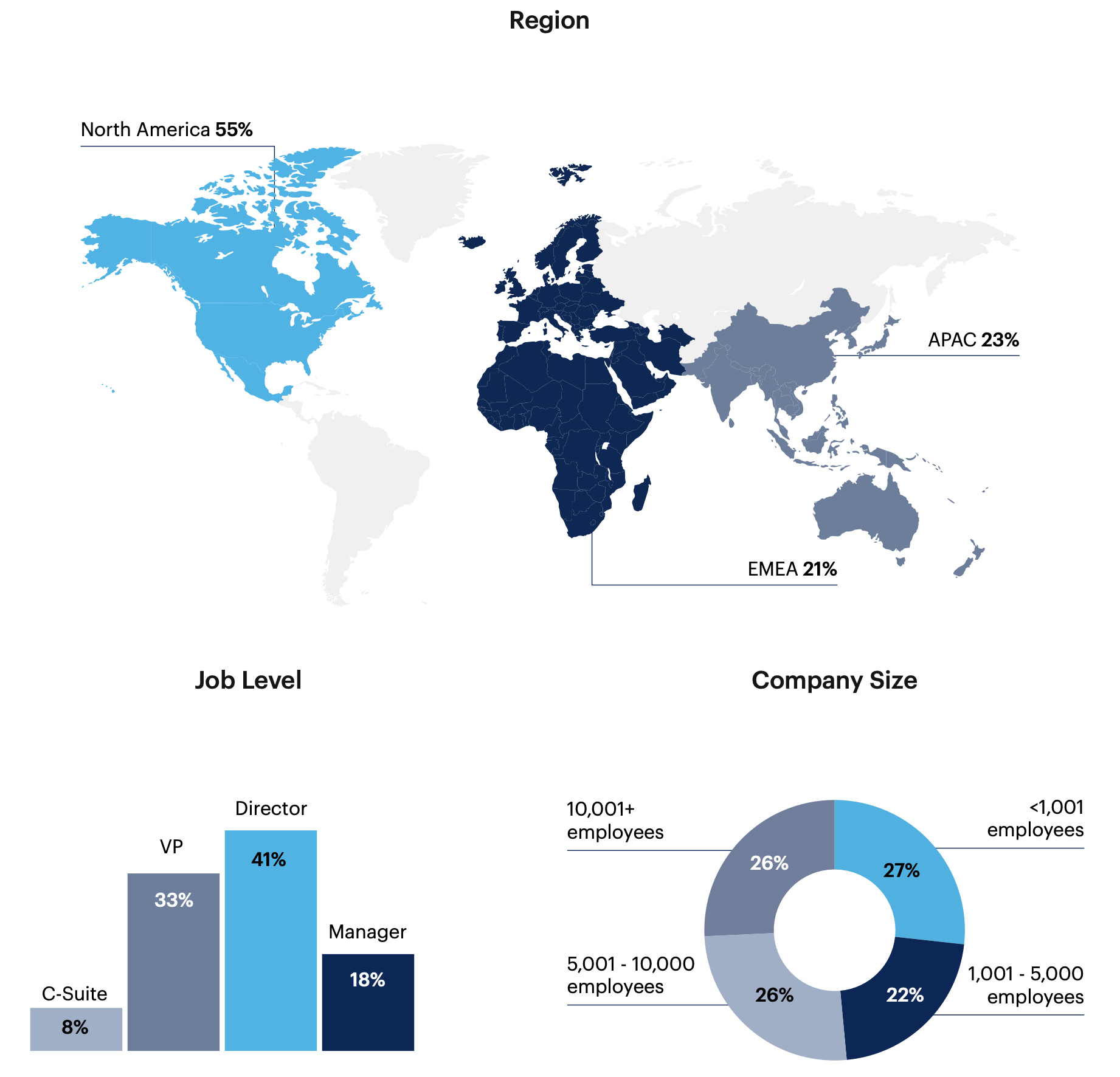
Note: May not add up to 100% due to rounding